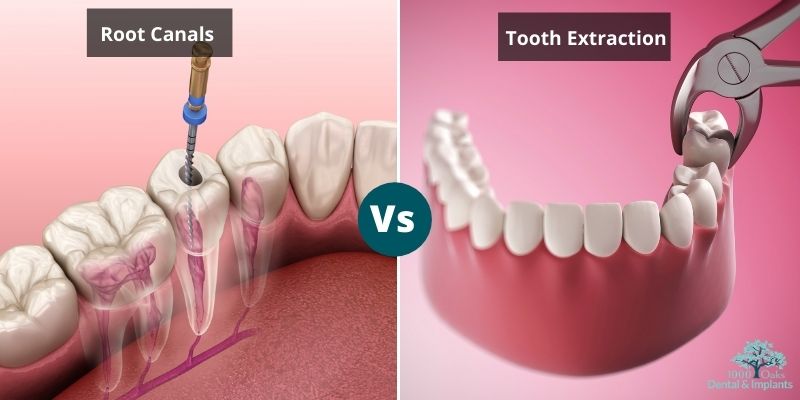When it comes to dental problems, finding affordable solutions is always a top priority. Two common procedures that offer relief for dental issues are root canals and tooth extractions. But which one is the better choice in terms of cost and effectiveness? In this article, we will explore the differences between root canals and tooth extractions and help you decide which option may be more suitable for your needs. So, let’s dive into the world of affordable dental solutions and compare the benefits of root canals versus tooth extractions.
When faced with a dental problem, it’s important to weigh the pros and cons of each procedure. Root canals involve removing the infected pulp from the tooth and filling it with a durable material, while tooth extractions involve removing the entire tooth from its socket. Both procedures have their advantages, but the cost and long-term implications are crucial factors to consider. By understanding the differences and benefits of root canals and tooth extractions, you can make an informed decision that suits your budget and dental health. So, let’s explore these affordable dental solutions and find the best option for you.
Affordable Dental Solutions: Root Canals vs. Tooth Extraction
When it comes to dental problems, two common solutions are root canals and tooth extraction. But which one is more affordable? Let’s compare the costs:
| Root Canal | Tooth Extraction |
|---|---|
| Requires multiple visits | Typically a one-time procedure |
| Preserves the natural tooth | Removes the entire tooth |
| May require a crown or filling | May require a dental implant or bridge |
| Costs vary depending on the tooth and location | Costs may be lower initially, but replacements can be expensive |
Ultimately, the decision between a root canal and tooth extraction should be made in consultation with your dentist. They can assess your specific situation and provide recommendations based on affordability, long-term oral health, and overall treatment goals.

Affordable Dental Solutions: Root Canals vs. Tooth Extraction
When it comes to dental problems, such as severe tooth decay or damage, two common solutions are root canals and tooth extractions. Both procedures aim to alleviate pain and restore oral health, but they differ in their approach and long-term effects. In this article, we will explore the key differences between root canals and tooth extractions, considering factors such as cost, recovery time, and overall effectiveness. By understanding the pros and cons of each option, you can make an informed decision about which dental solution is right for you.
Root Canals: A Closer Look
Root canals are a dental procedure that involves removing the infected pulp from the inside of a tooth. This procedure is typically recommended when the tooth’s nerve and blood vessels have been severely damaged by deep decay or trauma. The goal of a root canal is to save the natural tooth structure and eliminate infection, providing long-term relief from pain and preventing the need for extraction.
The process of a root canal involves several steps. First, the dentist will numb the area around the affected tooth to ensure a painless experience. Then, they will create a small opening in the tooth to access the infected pulp. Using specialized tools, the dentist will carefully remove the damaged pulp and clean the inside of the tooth. Finally, they will seal the tooth with a filling or crown to protect it from further damage.
The Benefits of Root Canals
Root canals offer several advantages over tooth extractions. Firstly, they allow you to preserve your natural tooth, maintaining the function and appearance of your smile. By eliminating the infection and restoring the tooth’s structure, root canals can provide long-term relief from pain and discomfort. Additionally, root canals have a high success rate and can last a lifetime with proper care. This makes them a cost-effective solution in the long run, as they eliminate the need for more extensive dental work, such as dental implants or bridges.
Another benefit of root canals is that they require less recovery time compared to tooth extractions. While the treated tooth may be sensitive for a few days, most patients can resume their normal activities shortly after the procedure. Root canals also help maintain the natural alignment of your teeth, preventing shifting and misalignment that can occur when a tooth is extracted. Overall, root canals offer a conservative and effective solution for saving damaged teeth and preserving oral health.
Root Canals vs. Tooth Extractions: Factors to Consider
When deciding between a root canal and a tooth extraction, there are several factors to consider. One of the primary considerations is the overall cost of the procedure. Root canals tend to be more expensive upfront compared to extractions, as they involve more intricate dental work. However, in the long term, root canals can be more cost-effective, as they eliminate the need for additional dental treatments to replace the missing tooth.
Recovery time is another crucial factor to think about. While both root canals and extractions may cause some discomfort, root canals typically have a shorter recovery period. After a tooth extraction, there may be a more extended healing process, and additional dental work, such as dental implants or bridges, may be necessary to restore the function and appearance of the missing tooth.
Furthermore, the impact on neighboring teeth is different for root canals and extractions. Root canals allow you to maintain the natural alignment of your teeth, preventing potential issues such as shifting or overcrowding. On the other hand, tooth extractions can disrupt the balance and alignment of your teeth, potentially requiring orthodontic treatment in the future.
In summary, while root canals and tooth extractions are both viable dental solutions, they differ in their approach and long-term effects. Root canals offer the benefits of preserving the natural tooth, long-term cost-effectiveness, and minimal impact on neighboring teeth. However, tooth extractions may be more suitable in certain cases, such as when the tooth is severely damaged beyond repair. Ultimately, it is important to consult with your dentist to determine which option is best for your specific dental needs.
Conclusion
In conclusion, the choice between a root canal and a tooth extraction depends on various factors, including the extent of the dental problem, cost considerations, and long-term oral health goals. Both procedures have their advantages and disadvantages, and it is essential to consult with a dental professional to determine the best course of action. By understanding the differences between root canals and tooth extractions and considering your individual circumstances, you can make an informed decision to restore your dental health and maintain a beautiful smile.
Key Takeaways: Affordable Dental Solutions – Root Canals vs. Tooth Extraction
- Root canals are a dental procedure used to save a damaged tooth by removing the infected pulp and filling it with a material to restore its function.
- Tooth extraction involves removing a tooth that cannot be saved, often due to severe decay or damage.
- Root canals are preferred over tooth extraction when possible, as they help preserve the natural tooth and maintain proper oral function.
- Root canals may be more affordable in the long run, as they prevent the need for further dental work or tooth replacement options.
- It’s important to consult with a dentist to determine the best course of action based on the specific dental issue and individual circumstances.
Final Summary: Making the Right Choice for Affordable Dental Solutions
So, there you have it! When it comes to affordable dental solutions, deciding between a root canal and tooth extraction can be a tough choice. Both procedures have their own benefits and considerations.
In conclusion, root canals are a great option for preserving your natural tooth and saving it from extraction. This procedure involves removing the infected pulp, cleaning the canals, and sealing them to prevent further infection. Root canals are generally less invasive and have a higher success rate, allowing you to maintain a healthy smile for longer. Plus, they often require less downtime and discomfort compared to tooth extractions.
On the other hand, tooth extraction may be necessary if the tooth is severely damaged, decayed, or crowded. While it may seem like a more affordable option upfront, it’s important to consider the long-term consequences. Tooth extractions can lead to bone loss and shifting teeth, which may require additional treatments like dental implants or bridges.
Ultimately, the best choice for you will depend on your specific dental situation and budget. It’s always a good idea to consult with your dentist to determine the most suitable and affordable dental solution for your needs. Remember, taking care of your oral health is an investment in your overall well-being, so choose wisely and prioritize the long-term health of your smile.









